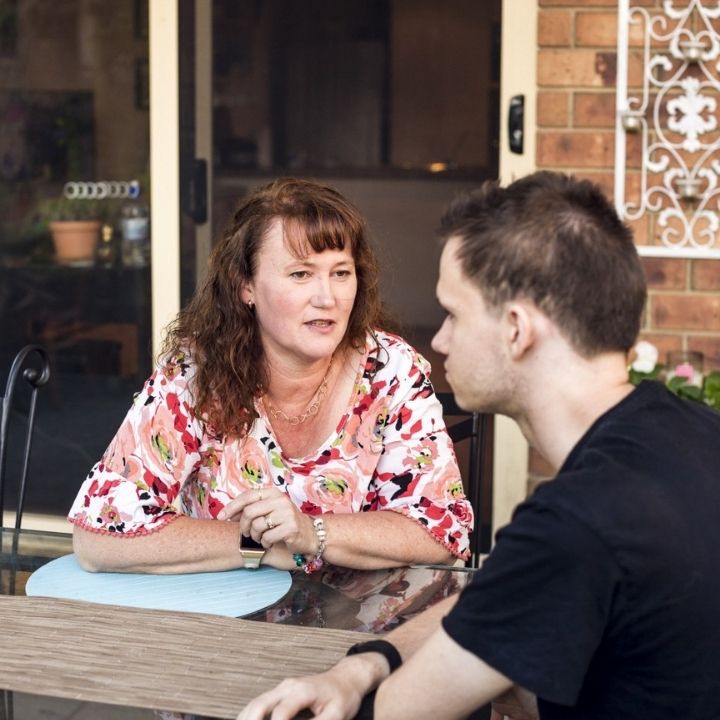It’s our body’s way of preparing us to manage challenging situations. Sometimes anxiety can help us perform better by making us feel alert and motivated.
Anxiety can come and go – but for some people, it can stick around for a long time, end up having a big impact on their daily lives, and stop them from achieving their full potential.
Family and friends might worry about what it means for their young person who is experiencing anxiety. It’s easy to think about ‘worst case scenarios’ which can feel overwhelming. However, if your young person is experiencing anxiety that’s impacting on their lives, the good news is that with the right support and tools, things can get better.
Download our fact sheet on anxiety
(PDF 393 kb)
What are the symptoms of anxiety?
Everyone experiences anxiety differently, but there are some common signs:
Physical symptoms of anxiety can include:
- a racing heart
- faster breathing
- feeling tense or having aches (especially neck, shoulders and back)
- sweating or feeling dizzy
- shaking
- ‘butterflies’ or feeling sick in the stomach.
Other signs of anxiety can include:
- persistent worrying and excessive fears
- being unable to control the worries
- being unable to relax
- avoiding challenging situations
- being socially isolated or withdrawn
- having trouble concentrating and paying attention
- feeling annoyed, irritated or restless
- poor sleep
- problems with work, social or family life
- panic attacks.
What are panic attacks?
Panic attacks are sudden rushes of intense anxiety or fear together with frightening thoughts and physical feelings.
During a panic attack, a person may suddenly be overcome by strong fear and physical symptoms of anxiety, like a pounding heart, sweating, difficulty breathing, shaking, feeling dizzy or feeling sick. Panic attacks are usually short (about 10 minutes) and often feel overwhelming. Someone experiencing a panic attack might feel like they’re having a heart attack or an asthma attack, or feel like they’re losing control.
Common anxiety disorders
Anxiety disorders involve more than temporary worry or fears. They can significantly affect how a person feels, thinks, behaves and interacts with others. People can experience different types of anxiety disorders, but it’s important to know that they can all be treated.
Some common anxiety disorders are:
- Generalised anxiety: Excessive worry about a variety of things, such as work or school performance. Someone experiencing generalised anxiety disorder may feel that their worries are out of control, feel tense and nervous most of the time, have trouble sleeping or find it hard to concentrate.
- Social anxiety: Intense anxiety in social situations due to fear of embarrassment or judgment by others. This often leads a person to avoid social situations, such as talking in class, going to parties, being the centre of attention or meeting new people.
- Separation anxiety: Intense anxiety about being away from loved ones, such as parents or siblings, or excessive worry about them being hurt.
- Agoraphobia: Intense anxiety about using public transport, being in open spaces, being in enclosed spaces, being in a crowd or being alone outside of home.
- Panic disorder: This is when a person has lots of panic attacks and experiences ongoing fears about having another panic attack.
- Specific phobias: Intense fear of a particular situation or object (like small spaces or spiders) that leads a person to avoid the situation or object.
Related problems
Many young people experiencing an anxiety disorder may also experience symptoms of depression. Some young people may also drink alcohol or take other drugs to ease the discomfort or make them feel more confident. But relying on alcohol or other drugs can make things much worse in the long run and cause long-term physical and mental health issues.
What can I do if I am concerned about my young person?
Family and friends play a vital role in supporting young people to manage their anxiety.
If you think your young person may be experiencing anxiety, it’s important to let them know you’re there for them and available for them to talk with you when they’re ready. Be honest about why you’re worried and let them know you care for them. If they aren’t ready to talk, let them know you’d like to check in with again soon. Reassure the young person they are not alone and let them know professional help is also available. (See our tips on starting the conversation about mental health.)
Take the time to listen to them and to understand what’s going on for them. Check that you have heard and understood them by saying (in your own words) what you understand about their experience. Avoid telling them to ‘just relax’ or ‘calm down’ – it’s not that easy.
Ask your young person about what has worked for them; what they have done to manage the anxiety or when they have noticed the anxiety has been less present for them. This builds their capacity to use skills and strategies that are effective.
Gently support and encourage them to face the situations or objects that make them feel anxious in their own time. Avoidance can make the anxiety worse because the young person never has an opportunity to learn that what they are afraid of may not happen or be as bad as they think. Encourage them to try some of the strategies in this article on managing anxiety.
You can model healthy ways of managing your own anxiety and share these with your young person, as appropriate.
Sometimes there can be frustration or impatience with a loved one who is not bouncing back as quickly as hoped. Reminding yourself that this is difficult for the young person and having empathy for them will enhance connection with your young person.
Learning more about anxiety will help you to understanding what your young person is going through and how you can support them.
When should I encourage professional help?
If your young person doesn’t seem to be improving over time, or if things seem to be getting worse, encourage them to seek professional help. You could support them to visit their local doctor or their nearest headspace centre, or contact eheadspace for online and phone support. If they are attending school, TAFE or university, they may also be able to access a student counselling or wellbeing service.
An important part of professional support is often psychological therapy. This might involve helping the young person to understand their experiences of anxiety and to address unhelpful thinking and behaviour patterns. In some instances, medication may also helpful.
The good news is that most young people with anxiety respond well to treatment. While their anxiety may still come and go from time to time, with right support and tools, your young person can get back to enjoying life again. Remember, getting support and treatment early can make a big difference when dealing with anxiety, and help to prevent further episodes of anxiety.
Looking after yourself
Supporting a young person experiencing anxiety can be challenging. Family and friends often neglect their own needs because they are busy looking after others, or because they feel guilty taking time for themselves. It’s important that while you take care of someone, you also look after your own mental health. Looking after yourself will also encourage your young person to do the same. Check out our tips on self care for family and friends.
Further information and support
Remember, professional support is available for both you and your young person. For more information, visit eheadspace for online and phone support or find your nearest headspace centre.
Other useful resources
-
Parent helplines (in every State and Territory of Australia) - Google ‘Parentline’ along with your State or Territory
-
Raising Children Network is an online resource for parents and carers filled with tips and tools for raising young people
-
Beyond Blue has lots of resources on mental health, and runs online forums
-
ReachOut has resources to help under 25s and their parents through tough times
-
headspace Group Chats hosts many discussions for family and friends with a range of topics. You can register to join or view the transcripts.
-
headspace has a number of interactive tools that can help young people and their family and friends reflect on their needs, engage in skill building and set meaningful goals to improve mental health and wellbeing.
Check out our supports for family
We offer a range of services to help parents, carers and other family provide support for young people when they are having a tough time.
The headspace Clinical Reference Group oversee and approve clinical resources made available on this website.
Last reviewed 27 April 2021
Get professional support
If you feel you need help there are a range of ways we can support you.


